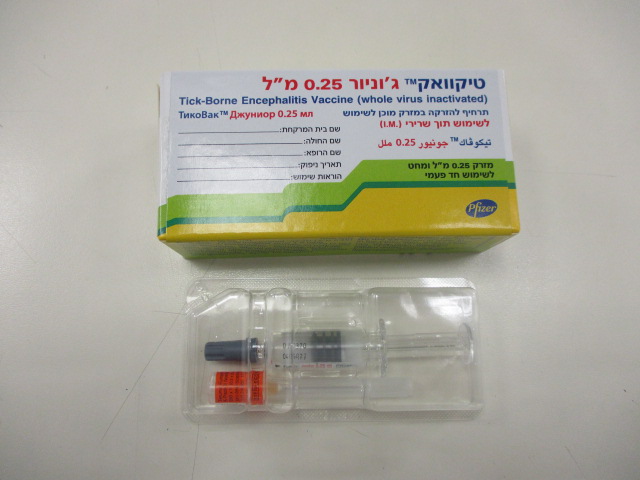Quest for the right Drug

טיקוואק ג'וניור 0.25 מ"ל TICOVAC JUNIOR 0.25 ML (ENCEPHALITIS, TICK BORNE, INACTIVATED, WHOLE VIRUS)
תרופה במרשם
תרופה בסל
נרקוטיקה
ציטוטוקסיקה
צורת מתן:
תוך-שרירי : I.M
צורת מינון:
תרחיף להזרקה : SUSPENSION FOR INJECTION
עלון לרופא
מינוניםPosology התוויות
Indications תופעות לוואי
Adverse reactions התוויות נגד
Contraindications אינטראקציות
Interactions מינון יתר
Overdose הריון/הנקה
Pregnancy & Lactation אוכלוסיות מיוחדות
Special populations תכונות פרמקולוגיות
Pharmacological properties מידע רוקחי
Pharmaceutical particulars אזהרת שימוש
Special Warning עלון לרופא
Physicians Leaflet
Adverse reactions : תופעות לוואי
4.8 Undesirable effects The calculated frequencies are based on a pooled analysis of adverse reactions reported after the 1st vaccination (3088 subjects) from 8 clinical studies conducted with TicoVac Junior 0.25 ml (1.2 µg) in subjects aged 1-15 years of age. Rates of systemic adverse reactions observed after the 2nd and 3rd vaccination were lower than after the 1st vaccination. Comparable rates of injection site reactions are observed after the first, second and third vaccination. The following other undesirable effects listed in this Section are given according to the recommended frequency convention: Adverse Reactions from clinical trials System organ class Frequency Very common Common Uncommon Rare (1/10) (1/100 to <1/10) (1/1,000 to <1/100) (1/10,000 to <1/1,000) Blood and lymphatic Lymphadenopathy system disorders Metabolism and nutrition Decreased Appetite disorders Psychiatric disorders Restlessness1, Sleeping disorder Nervous system disorders Headache Sensory abnormalities, Dizziness Ear and labyrinth Vertigo disorders Gastrointestinal disorders Nausea, Abdominal pain Diarrhoea, Vomiting Dyspepsia Skin and subcutaneous Urticaria tissue disorders Musculoskeletal and Myalgia Arthralgia connective tissue disorders 1 Frequency is estimated based on data from children aged 1-5 years 2023-0088615 Page 4 of 8 General disorders and Injection site Pyrexia3, Chills Injection site administration site reactions2 e.g., 4 pruritus Fatigue, Malaise conditions Injection site pain Injection site reactions such as • Swelling • Induration • Erythema Fever was measured rectally in children up to at least 3 years of age and orally in children 3 years of age and older. The analysis includes any fever temporally associated with vaccination whether or not causally related. Fever is age dependent and is decreasing with the number of vaccinations. In a safety study and dose finding studies the fever rates observed after the first vaccination were as follows: 1 to 2 year olds (n=262): mild fever (38-39°C) in 27.9%; moderate fever (39.1-40.0°C) in 3.4%; no severe fever (>40°C). 3 to 15 year olds (n=2519): mild fever in 6.8%; moderate fever in 0.6%; no severe fever (>40°C). Fever rates reported after the second vaccination are generally lower as compared to the fever rates after the first vaccination: 15.6% (41/263) in 1 to 2 year old children and 1.9% (49/2522) in 3 to 15 year old children. Adverse reactions from post-marketing surveillance The following additional adverse reactions have been reported in post-marketing experience. System organ class Frequency* Rare (1/10,000 to <1/1,000) Immune system disorders Anaphylactic reaction, hypersensitivity Nervous system disorders Encephalitis, convulsion (including febrile), meningism, polyneuropathy, motor dysfunction (hemiparesis/hemiplegia facial paresis, paralysis/paresis, neuritis), Guillain-Barré syndrome Eye disorders Visual impairment, photophobia, eye pain Ear and labyrinth disorders Tinnitus Respiratory, thoracic and mediastinal Dyspnea disorders Skin and subcutaneous tissue disorders Rash (erythematous, maculopapular, vesicular), erythema, pruritus, hyperhidrosis Musculoskeletal and connective tissue Neck pain, musculoskeletal stiffness (including neck stiffness), disorders pain in extremity General disorders and administration site Gait disturbance, influenza-like illness, asthenia, edema conditions * The upper limit of the 95% confidence interval of the event frequency is calculated with 3/n, with n representing the number of subjects included in all clinical trials with TicoVac Junior 0.25 ml. Therefore, the calculated frequency “rare” represents the theoretical maximum frequency for these events 2 A subject may have experienced more than 1 event. 3 Fevers occurred more frequently in younger than in older children (i.e., Very common to Common, respectively). Fever rates after the second and third vaccinations are generally lower than after the first vaccination. 4 Frequency is estimated based on data from children aged 6 – 15 years. 2023-0088615 Page 5 of 8 In a small comparative study on the immune response after intramuscular and subcutaneous administration of Ticovac in healthy adults, the subcutaneous route led to a higher local reactogenicity profile, particularly in women. No data are available in children. Reporting of suspected adverse reactions Reporting suspected adverse reactions after authorisation of the medicinal product is important. It allows continued monitoring of the benefit/risk balance of the medicinal product. Any suspected adverse events should be reported to the Ministry of Health according to the National Regulation by using an online form https://sideeffects.health.gov.il/.

שימוש לפי פנקס קופ''ח כללית 1994
לא צוין
תאריך הכללה מקורי בסל
לא צוין
הגבלות
לא צוין
מידע נוסף
